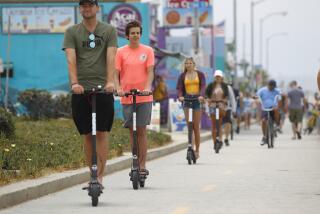Youngsters Make Too Many Waves : Florida Cracks Down on Safety of Watercraft
- Share via
MIAMI — Along Florida waterways a new kind of traffic is worrying the Marine Patrol--water scooters, sometimes piloted by children hardly old enough to ride a bicycle.
The model names on this aquatic Interstate 95 ring with excitement: Kawasaki makes Jet Skis, Yamaha sells Wave Runners and Progressive Power Corp. offers the Surf Jet, for example.
But the boats that resemble snowmobiles are increasingly a factor in some of Florida’s worst accidents, and complaints about operators are growing.
“The Florida Marine Patrol seems to come in contact with an awful lot of people who are not safe and responsible, who are not reasonable and prudent,” patrol Capt. Mike Lamphear said. “They have lost touch with reality.”
Two Accidents Cited
A 9-year-old boy died in March after his scooter, dead in the water, was hit by another of the 7-foot-long craft in Biscayne Bay off Miami. A 5-year-old boy survived after his head and chest were slashed open by a boat that ran over his scooter in a lake north of Miami, also in March.
J. B. Spence, attorney for the family of the 9-year-old victim, accuses operators of terrorizing swimmers and other boaters and has a personal lawsuit pending against riders who frequent a canal by his house in the Florida Keys.
“You see what they’re like. They’re like bucking broncos, they ride the wake, they race,” said Spence, who likens the machines’ sound to the roar of a chainsaw. “They’re just absolutely so rude and arrogant that I sued them. I’m going to take them into court and try to teach them some manners.”
The two Miami accidents have focused attention on the first statewide effort to regulate the low-riding vessels that are propelled by a concentrated jet of water. Riders sit or kneel on the machines, depending on the model.
Makers Back Legislation
The six manufacturers of personal watercraft, which generally cost $2,500 to $4,500, support the legislation by state Sen. Tom McPherson, and view it as a national model to regulate the skis and their free-wheeling operators.
The measure was approved unanimously in late April by the Florida Senate and was passed overwhelmingly by the House last Friday.
Quick to realize they could be at risk from government regulators, the manufacturers--the other three are Wet Jet International, Bombardier and Ultranautics--support McPherson’s bill. It sets an operator age limit of 14 for private vessels and 16 for rentals, banning reckless operation, restricting operation to daylight hours, requiring operators to wear flotation vests and a cut-off switch to stop the engine if the rider falls off. Violation, a second-degree misdemeanor, would carry a $35 fine or 60 days in jail.
Weaving through congested traffic, jumping wakes and “playing chicken” would be outlawed, said Maj. Denis Grealish, boating safety coordinator for the marine patrol. “None of our investigations have revealed any inherent safety problem or defects with the craft.
Need Strength, Judgment
“All of our problems have been caused by operator error. When you look at these types of craft and the type of quick, fast movement they’re capable of and the centrifugal forces operating against these people as they’re making turns, you have to have a certain amount of strength, coordination, balance and judgment to operate these things.”
The Personal Watercraft Industry Assn., representing the six manufacturers, also is monitoring other efforts to regulate the craft, such as an assortment of New Hampshire bills that would ban the vessels on small lakes where residents have registered noise complaints.
The organization estimates that 150,000 Americans own the scooters.
Most regulations are imposed locally for specific water bodies but the industry hopes to take the Florida bill to Texas next in its bid to spread the measure nationally, said John Dane, government relations representative in Washington for the National Marine Manufacturers Assn.
“We’re hoping this bill serves as a national model,” Dane said.
The problem in Florida is compounded by burgeoning enthusiasm for boating. Roughly 680,000 vessels, including 10,000 personal watercraft, are registered to operate along Florida’s 1,350 miles of coastline and 11,000 miles of rivers, creeks and streams. Grealish estimates another 200,000 to 300,000 boats operate in Florida on a transient basis.
State Leads in Fatalities
The state leads the nation in boating fatalities with 106 in 1987 and 94 in 1988. Six involved personal watercraft last year. Of the state’s 11 fatalities with personal watercraft, only two involved minors. Most victims are men ranging from their late teens to mid-30s.
McPherson has used the 1987 ban on the manufacture of three-wheel all-terrain vehicles, blamed for nearly 1,000 deaths and 300,000 injuries in five years, as a club in his bid to regulate personal watercraft.
More to Read
Sign up for Essential California
The most important California stories and recommendations in your inbox every morning.
You may occasionally receive promotional content from the Los Angeles Times.













